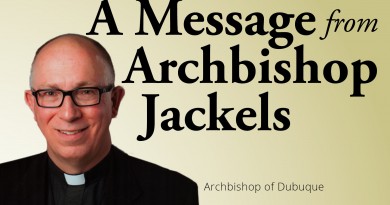Archbishop offers his perspective on accusations against Pope Francis
People have questions and confusion about an accusation made against our Holy Father Pope Francis.
At the end of last month the former papal representative to the USA (who left that post in 2016, when he reached the mandatory retirement age) claimed that Pope Francis knew about but did nothing about the sinful behavior of a now-disgraced and former Cardinal, and so he thinks the Holy Father should resign.
I have not read the letter accusing the Holy Father, but those who have, and who are in the know, comment on how there are many holes in the testimony, and that it is sometimes ambiguous.
The Pope has declined to comment on the accusation, until September 3rd, in his homily at morning Mass, in the course of his reflection on the gospel of that day (Luke 4:16-30).
In his homily, the Holy Father didn’t make specific reference to himself or to his accuser; rather, he did what Jesus did in the Nazareth synagogue, namely, used the word of God to speak about himself.
The gospel passage tells about a visit Jesus made to the synagogue in Nazareth. Jesus read from the prophet Isaiah, and then commented that he is the fulfillment of the prophecy.
The people in the synagogue were beside themselves with rage at his words, and intended to do harm to Jesus, to throw him off a cliff. Jesus remained silent before his accusers, passed through the midst of them, and went away.
The Pope said that it was the devil, the father of lies, who planted a seed in people’s hearts, which changed their delight with Jesus to an irrational rage.
He pointed to the example of Jesus, that silence, prayer, and embracing the cross are ways to respond to people who malign and gossip, and who do not have good will, who seek only scandal, division, and destruction.
And the Pope recommended praying for the grace to discern when to speak and when to remain silent.
The scene in the gospel passage from Luke bears a striking resemblance to the fury presently directed towards the Pope. It would seem he characterizes the accusation as defamation and gossip. In response, he is taking the advice offered in his homily: silence, prayer, and embrace the cross.
A serious accusation like that made against the Holy Father should be handled the same as any allegation of sex abuse or cover-up.
The first question asked is if the accusation has a semblance of truth, meaning it is not in itself manifestly false or frivolous.
If it does have a semblance of truth, then an investigation is launched to see if the accusation is credible, if there is sufficient evidence to believe that it did occur.
But even that is not a judgment of guilt; rather, some sort of judicial process is required to determine guilt or not. Until such time, the accused is presumed innocent until proven otherwise.
With regard to the accusation, some people (even some bishops), with hardly the time for mature reflection, let alone consultation with a Review Board, have opined that it is not only credible, but that the Pope must be guilty.
Moreover, their judgment seems to be based only on the fact that they like the accuser (which is I might add not a universally-held opinion).
Well, for what it’s worth, unlike his detractors, I like the Pope, but I like even more the justice enshrined in the presumption of innocence and due process, and I hate the injustice done to anyone’s reputation by defamation and gossip.
This is one in a series of reflections Archbishop Jackels has written on the sex abuse scandals in the church. The rest are also available at TheWitnessOnline.org. To view them search for “Archbishop Jackels’ Messages.”



